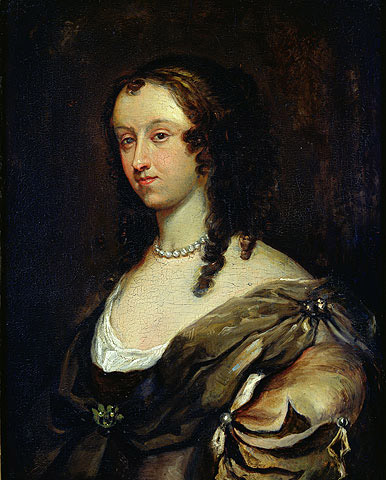 Aphra Behn, by Mary Beale
Aphra Behn, by Mary Beale
I am having a great deal of fun teaching Aphra Behn’s play The Rover this week. Written in 1677 during the reign of Charles II, it is a rollicking sex comedy that proved to be very popular. A woman writing for the stage was in itself extraordinary. That the play makes a compelling case that women should be as free to indulge in love affairs as men puts The Rover in a class by itself.
But then, Behn was already in a class by herself. Having spent a couple of her adolescent years in South America (Surinam), she returned to England, served as a spy in the English wars against the Dutch, spent a session in debtors prison, and then went on to make a living by her pen. Called “the Divine Astrea,” she was beautiful as well as talented and had a fan in Charles II. Along with plays she wrote political pamphlets, erotic poetry, and the slave narrative Oroonoko, her masterpiece. Virginia Woolf has written that all women should “let flowers fall upon the tomb of Aphra Behn, for it was she who earned them the right to speak their minds.”
Behn may have earned them the right, but I can think of no woman author before Anais Nin in the 1930’s (and then no one until Erica Jong in the 1960’s) who talks so openly about women’s sexual desires. “I don’t intend every he that likes me shall have me, but he that I like,” Hellena says to her sister in The Rover. “I came hence . . . to love and to be beloved; and I will be beloved, or I’ll get one of your men, so I will.”
Later bantering with Willmore, the inconstant libertine that she has set out to conquer, she says, “I am as inconstant as you, for I have considered, captain, that a handsome woman has a great deal to do whilst her face is good. For then is our harvest-time to gather friends, and should I in these days of my youth catch a fit of foolish constancy, I were undone: ‘tis loitering by daylight in our great journey. Therefore, I declare I’ll allow but one year for love, one year for indifference, and one year for hate; and then go hang yourself, for I profess myself the gay, the kind, and the inconstant. The devil’s in’t if this won’t please you.”
It’s unclear whether Hellena or Willmore is “the rover” of the title. Perhaps both are. Willmore is clearly based on John Wilmot, Second Earl of Rochester, who I have written about previously. Libertine though he is, Behn admires him and from her play one can see why. It is as though she takes as a challenge a line from his poem “To a Lady in a Letter”: “But did you love your pleasure less/You were no match for me.” Behn has taken to heart Rochester’s apparent call for sexual liberation.
In fact, the parry and thrust between Hellena and Willmore reminds one of the screwball comedies of the 1930’s—say His Girl Friday—with no quarter given or taken. Willmore wants Hellena’s honey and she, while all prepared to give it, is not willing to end up with “a cradle full of noise and mischief, with a pack of repentance at my back.” When she proposes marriage, he counters that “Marriage is as certain a bane to love as lending money is to friendship.” She in turn asserts that his appetites are modest compared to hers. As she puts it earlier, “When I begin [to love], I fancy I shall love like anything.”
In that exchange he says,” Oh, I long to come first to the banquet of love! And such a swinging appetite I bring. Oh, I’m impatient. Thy lodging, sweetheart, thy lodging, or I’m a dead man!” To which she replies, “Why must we be either guilty of fornication or murder if we converse with you men? And is there no difference between leave to love me, and leave to lie with me?” To which he says, “Faith, child, they were made to go together.”
In the end they do get married. She promises—and one believes her—that their marriage will never be dull.
In writing her play, Behn was going head to head with other Restoration comedies, like William Wycherley’s Country Wife and George Etheredge’s Man of Mode. In one way, she was showing the guys that she could be just as bawdy and free as they were. When one thinks of the options open to women in the following two and a half centuries—Jane Austen and the Brontes and George Eliot were neither allowed, nor could they have conceived voicing, such sexual openness—Behn seems all the more amazing. My women students invariably get a kick out of her.
Yet there is a dark hint of women’s potential victimization that runs through The Rover, distinguishing it from the other comedies and giving it a special feel. I will write on that tomorrow.
One Trackback
[…] that has a rape scene—the other is Aphra Behn’s The Rover (which I’ve written about here and here)—and such scenes reveal women’s concerns. When men can’t get their way through reason, they […]